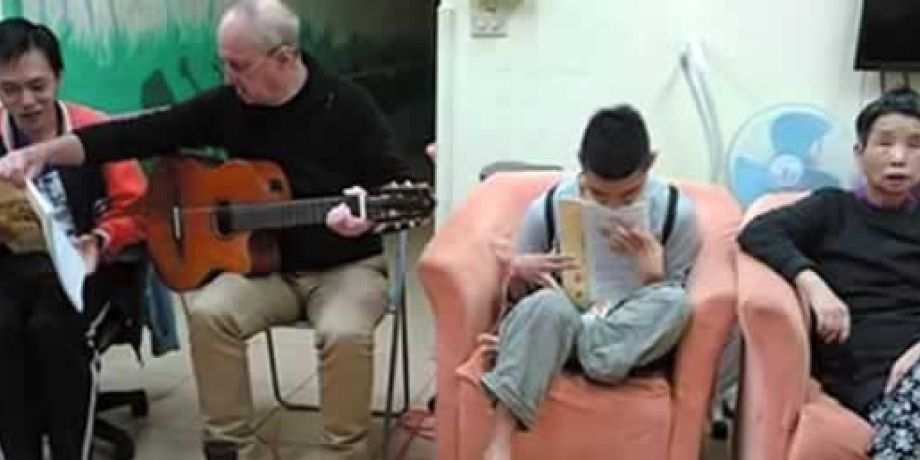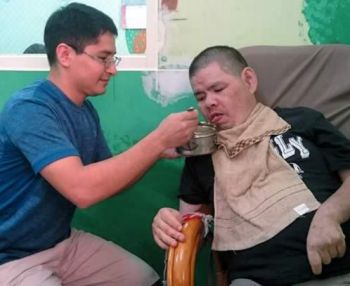
An Invitation to be Aware
The Ai Jia Development Center was founded by the Hsinchu Catholic diocese in Taiwan to help and support mentally challenged adult students. Like in many other countries, mentally challenged people in Taiwan are not considered as important. Consequently, there are not enough social benefits to cover their daily needs. I have been working as a volunteer at the Center for more than six months, and I have had a very fruitful experience. At the beginning I had some difficulties, but step by step I was able to enjoy my time at the Center.

seminarian working in Taiwan.
When I started my volunteer work, I felt I was not able to communicate well in Chinese with the teachers and students. I needed to talk with the teachers about the daily activities for the students, but I could not understand what they were talking about which made me feel sad and tired. Also I had to speak with the students, and I felt they did not understand my Chinese. At that stage, I had no self-confidence even with simple words. Moreover, in my daily activities I had no one to speak to in English, so I had to speak Chinese. What I learned from this experience is that the spoken language is not the only way of communicating.
For example, the students frequently manifested their feelings in their facial expressions or gestures.
At the beginning I did not feel comfortable with the students. Even though in theory I knew the students at the center were the same as me in having dignity as persons, I could not feel they were the same as me. I felt that I was normal and they were not. I was better because I was normal. Those feelings did not help me. They made me create a wall between me and the students. In order to realize they are the same as me, I needed to stay, spend time and share with them. When I began learning their names the students started to become familiar to me, and it helped me to break down the wall of prejudice I had built between me and them. I began to feel comfortable being with the students and to enjoy my time with them. After this experience I realized that we are the same. The borders I had created between being normal and abnormal disappeared, and there were only people. My feelings of who is normal and who is not changed. I am not better than they are. My daily interaction with the students both challenged and helped me to change my previous mindset.
With that change in myself, I knew I could learn from the students. Since I had completed two degrees at university, I thought I could teach them, and I could only learn from people that had more academic formation than me. However, the students have been teaching me. One of the things I have learned from the students is to appreciate the simple things. The students at the Center enjoy activities such as an outing to a park. I use to think that there is nothing special in this ordinary kind of activity. To appreciate an activity it had to be extraordinary. At this time, I can say that I have learned that life has plenty of simple things that make it extraordinary. However, it is not easy to put this into practice. It means that everything I do I must appreciate, such us having a walk or sitting in a park and having a soft drink and snacks. These activities can be as meaningful to me as they are for the students. The students have been my teachers, and I am grateful for everything I have learned from them.
The students have clear priorities that always include others. For example, in our prayer time at the Center the students always prayed for their close relatives, teachers, staff and other students. This made me think that I too must care for people around me. The students made me aware that I cannot be individualistic. Others must be present in my daily life.
Actually, caring for others is one of the most important parts of my faith as a Catholic, but it cannot be limited only to people of my own religion. People do not need to be Catholic to be open and caring for others. The students of Ai Jia Center showed me that because they have different religions.
During my time at Ai Jia Center I was challenged to break down my prejudices, and to overcome my difficulties in communicating with the students and teachers. I was challenged to live life with people who are marginalized in our society. It is a constant invitation to be aware about who are the mentally challenged to me in my daily life. I am looking forward to other such rich experiences that will help me to be more open-minded.
Salustino Villalobos Mondragon, pictured above in the blue shirt, is a Columban seminarian currently living in Taiwan.